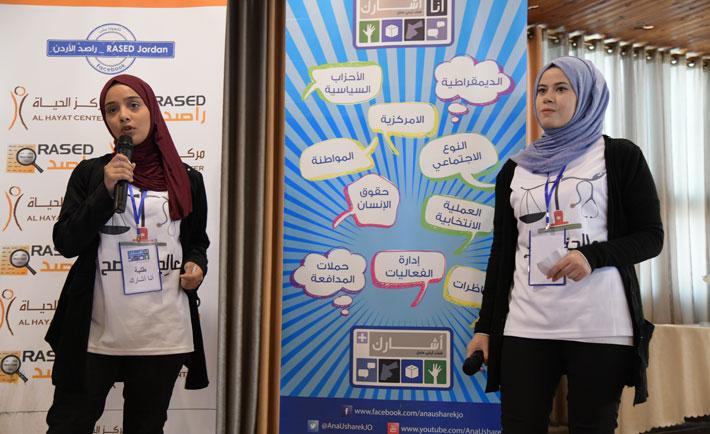
As part of a series of events organized by NDI’s Jordan youth political participation program Ana Usharek and the Al-Hayat Center for Civil Society Development – NDI’s local partner – 60 Ana Usharek students participated in a networking and coalition-building event on December 5 with 43 local civil society organizations in Zarqa, Jordan. Photo Credit: NDI Jordan
It is important to remember the task of safeguarding democracy at home, and encouraging and supporting democracy abroad is an unending one. There is no such thing as a fully consolidated democracy. Various shocks and strains, whether internal or exogenous, will constantly test the resilience of democratic institutions. Likewise, there is no such thing as a “graduated” emerging democracy.
From Hungary to Macedonia, Venezuela to El Salvador, and the Philippines to Brazil, we see that once solid democratic progress can be reversed in short order and that public attitudes can shift with frightening speed. Of course, there are opposite and positive cases – a peace agreement and subsequent governance progress in Colombia, a shocking election result in Malaysia that upended the authoritarian government, and recent unprecedented opportunities for women in government in Ethiopia. Clearly, the state of democracy in the world is in flux, and, while there are some positive indicators, it would seem that democracy and multilateralism are under attack in many parts of the world.
Clearly, the state of democracy in the world is in flux, and, while there are some positive indicators, it would seem that democracy and multilateralism are under attack in many parts of the world.
Unfortunately, the traditional and typical strategies for promoting and strengthening democracy have lost some of their effectiveness. Unlike the heady days of what Samuel P. Huntington called the “third wave of democracy,” (starting in about 1974 and continuing through the 1980s) democracy is no longer seen as a panacea by many populations. Intractable conflicts and economic doldrums often catalyze a yearning for the old days – even if the old days featured much less freedom. In Syria and Libya, some of the Balkan states and even parts of the former Soviet Union, citizens increasingly voice nostalgia for an authoritarian system that at least brought predictability.
Across the Middle East and North Africa (MENA), many of the drivers of the 2011 uprisings remain. Aging political leaders, unresponsive governing institutions, the exclusion of marginalized groups, dim economic prospects, and the perception of official corruption are endemic. Further, the region’s youth bulge heightens the risk of new upheaval if they remain excluded from decision-making processes. According to the UNDP’s 2016 Arab Human Development Report, 60 percent of the population in the MENA region is under the age of 30. Young people are coming of age at a time when unemployment in MENA is twice the global average, regional youth voting rates are the lowest in the world and the rate of youth participation in protests is on the rise.
Around the world, there is deep distrust in the institutions of government and skepticism about the complexity and compromise required in most democratic systems. Established democracies are not immune to this phenomenon. Political parties are unpopular and even reviled in many countries. Free media is under attack around the world and elected legislative bodies are generally held in low regard.
Around the world, there is deep distrust in the institutions of government and skepticism about the complexity and compromise required in most democratic systems. Established democracies are not immune to this phenomenon.
The alliance of democratic nations which had been acting in concert after World War II to create a new economic order and new military alliances also played an essential role in encouraging and supporting the third wave of democratization. With hindsight, it is clear that the promotion of democracy, rule of law and respect for human rights was viewed by non-democratic China and Russia as a western tactic to isolate them.
The decline in multilateralism and democracy are inextricably linked. Democracy thrives in an interconnected world where countries act with collective responsibility and seek shared rules. Democracy is endangered in a world where the most powerful players seek to make their own rules, form coalitions of convenience and control and manipulate multilateral fora. But there will be no demand for democracy and multilateralism unless democracy is seen as a system which delivers a better life. Democracy should deliver security and economic progress – not chaos.
While authoritarianism can be made to look attractive in the short-term, long-term there is no better alternative than democracy to deliver stability, security, economic growth and human rights.
While the number of democracies has increased in the last several decades, democratic systems have not necessarily delivered economic or physical security, leaving many people disillusioned. A number of western democracies have been particularly challenged by mass migration and unprecedented refugee flows. All democracies have been affected by the economic dislocation and alienation caused by the rapid pace of technological change. These factors play into the anti-democratic, anti-internationalist playbook of the large authoritarian powers. It is easy to blame democracy for a variety of ills and make the authoritarian model look attractive. But while authoritarianism can be made to look attractive in the short-term, long-term there is no better alternative than democracy to deliver stability, security, economic growth and human rights.
So what do we do to reverse the recent anti-democratic trend? Stay tuned and subscribe to the DemWorks blog for my next post, which will take a look at possible responses to the decline in democracy and multilateralism.
